- Contents
To understand how brands’ reactions to the world around them influence consumer behaviors and perceptions, GeoPoll conducted a study in July 2021 in South Africa using our mobile web platform. The study addressed three primary research topics:
- Brand reactions to COVID-19
- The importance of diversity and inclusivity in advertising
- The impact of influencer marketing
The survey gathered feedback from approximately 700 respondents with a gender composition of 61% females and 39% males, an age breakdown of 27% ages 15-25, 33% ages 26-35, and 39% ages 36 and over, and representation from all nine provinces in South Africa.
GeoPoll produced an initial summary of the research findings along with an interactive dashboard of the research data in early August. In this supplemental summary, we detail consumers’ responses to the five open-ended survey questions listed below:
- In your opinion, which brands, if any, have responded well to COVID-19 in their advertising?
- Which brands, if any, have failed in their advertising response to COVID-19 or negatively impacted your impression of the brand?
- Which brands, if any, have effectively addressed inclusivity and diversity in their ads?
- What are the names of the influencers you follow most?
- Which brands, if any, were you influenced to buy based on the review or recommendation of an influencer?
Brand Reactions to COVID-19
The social and economic disruption caused by the coronavirus pandemic has impacted how consumers across the globe interact with brands. According to a McKinsey study, 79% of consumers in South Africa have changed stores, brands, or the way they shop due to the pandemic. In our study, most respondents (64%) say how brands reacted to COVID-19 in their advertising influenced which products or brands they purchased.
Positive Brand Reactions to COVID-19
South Africa has suffered the highest number of confirmed cases and deaths from COVID-19 in Africa. With limited access to the vaccine, many are forced to rely on public health measures to slow the spread of the disease. And they appreciate brands using their advertising spend to promote public health.  When asked which brands responded well to COVID-19 in their advertising, the top two brands mentioned by far, Lifebuoy and Dettol, produced ads informing consumers how to use their soap, sanitizer, and disinfectant products to lessen the spread of coronavirus.
When asked which brands responded well to COVID-19 in their advertising, the top two brands mentioned by far, Lifebuoy and Dettol, produced ads informing consumers how to use their soap, sanitizer, and disinfectant products to lessen the spread of coronavirus.
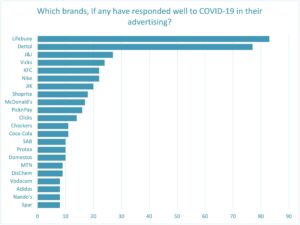
Johnson & Johnson, the US pharmaceutical company that is providing and manufacturing its COVID-19 vaccine in South Africa also produced ads that resonated with many respondents, as did Vicks, which offers products used to alleviate the symptoms of respiratory illnesses.
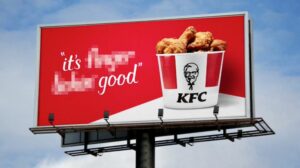 Taking a completely different approach, KFC decided to keep its ads light-hearted and entertaining, temporarily blurring out part of the brands well-known slogan, Finger Lickin’ Good, for the sake of public health.
Taking a completely different approach, KFC decided to keep its ads light-hearted and entertaining, temporarily blurring out part of the brands well-known slogan, Finger Lickin’ Good, for the sake of public health.
Whether sharing helpful COVID-19 information, promoting COVID-related products and vaccination, or just providing some much-needed comic relief, consumers do not want brands to shy away from the pandemic. In our study, practically no one believed brands should ignore COVID-19 in their ads (3%) or stop advertising completely (4%).
Negative Brand Reactions to COVID-19
Consumers had a more difficult time citing brands that responded poorly to COVID-19 in their advertising rather than positively. Approximately 2 out of 3 respondents were not able to list a single brand.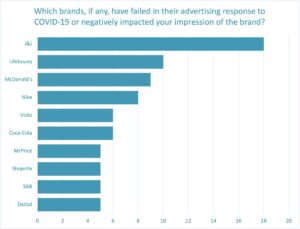
The tumultuous rollout of the Johnson & Johnson vaccine in South Africa apparently caused negative perceptions for some consumers. After the vaccine was administered to healthcare workers in February, and conditionally approved by the South African Health Products Regulatory Authority in April, the company was forced to halt production and destroy more than two million doses due to contamination in a manufacturing plant in the US. Johnson & Johnson’s advertising was not able to overcome all that negative press for some respondents in this study.
While Lifebuoy’s COVID-19 ads received more positive feedback than any other brand, a relatively small number of respondents had negative reactions. Either way, Lifebuoy’s ads have been clearly noticed by many.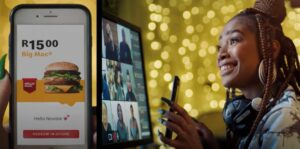
Major international brands McDonald’s, Nike, and Coca-Cola also produced ads that generated mixed reactions. Applying the industry adage that “bad press is better than no press,” all three companies are likely at least somewhat pleased with the recognition of their campaigns.
The Importance of Diversity and Inclusivity in Advertising
Diverse and inclusive advertising portrays people from all backgrounds, regardless of race, ethnicity, gender identity, age, religion, ability, sexual orientation, or otherwise. It portrays people from marginalized communities previously excluded from most ads. In our study, approximately half of respondents (49%) consider it “very important” for brands to portray diversity and inclusivity in their advertising. That number jumps to 62% for respondents ages 15-25, demonstrating heightened social consciousness in the younger demographic.
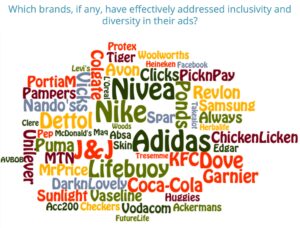
Several brands stand out for specifically and effectively addressing inclusivity and diversity in their advertising:
 Nike: Nike’s recent “split-screen” ad campaign features a host of professional athletes, including Cristiano Ronaldo, Serena Williams, Colin Kaepernick, and South African athlete Caster Semenya, as well as amateur athletes from a variety of races, ethnicities, religions, genders, and abilities. The message behind the ad is about the power of sports and its ability to unify people.
Nike: Nike’s recent “split-screen” ad campaign features a host of professional athletes, including Cristiano Ronaldo, Serena Williams, Colin Kaepernick, and South African athlete Caster Semenya, as well as amateur athletes from a variety of races, ethnicities, religions, genders, and abilities. The message behind the ad is about the power of sports and its ability to unify people.- Adidas: One of Adidas’ recent ads follows the same premise as Nike’s, telling the story of how South Africa’s first Black rugby captain, Siya Kolisi, saw the possibilities of uniting all people through sport.
- Nivea: Nivea’s ads promote its skincare products by encouraging consumers to “wear your skin with pride” and “celebrate the skin you’re in” featuring models of a variety of shapes, sizes, and ethnic backgrounds.
Respondents claim to be inspired by diverse and inclusive advertising. Most in our study (66%) said they were inspired to take some kind of action after seeing an ad they considered to be diverse or inclusive. Almost half (46%) “bought or considered buying the product or service” advertised.
The Impact of Influencer Marketing
An influencer is an individual who has created an audience or fan base that they are able to influence via online channels, such as social media, blogs, podcasts, etc. In many cases, influencers profit through promoting products to their audiences, a strategy known as influencer marketing, which has now become a multi-billion dollar industry.
Most Followed Influencers
Most influencers focus on particular niche topics that they create content around to engage their followers. In our survey, food, lifestyle, fashion, and fitness surfaced as the most popular categories of influencers. In terms of types of influencers, the largest percentage of respondents (67%) report following celebrity influencers. Celebrity influencers also dominate the list of specific influencers respondents claim to follow.
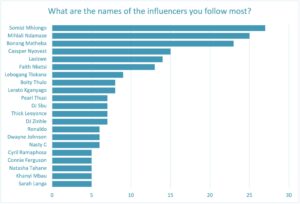
The top celebrity influencers mentioned include a mix of actors (Somizi Mhlongo, Pearl Thusi, Dwayne Johnson, Connie Ferguson, etc.), TV personalities (Bonang Matheba, Lasizwe, Boity Thulo, Lerato Kganyago, etc.), and musicians (Cassper Nyovest, DJ Sbu, DJ Zinhle, Nasty C, etc.). International football star Ronaldo, and the President of South Africa, Cyril Ramaphosa, also made the top 20 most-mentioned list.
On the other hand, many consumers express more interest in following someone whose life seems more real and attainable than a celebrity’s. Although most of the hundreds of different influencers mentioned by respondents are regular social media users (with relatively small followings), some have built up substantial followings to become social media sensations. Some of the most frequently mentioned include, Mihladi Ndamase, Faith Nketsi, Lebogang Tlokana – commonly known as “The Funny Chef,” and Thick Leeyonce.
Influencer-inspired Brand Purchases
Many businesses are now engaging online influencers to push products and improve brand awareness among their target audiences – especially young consumers. In our study, most younger respondents (65%) said they have purchased a product based on an influencer’s recommendation, compared to 47% of older respondents. Even a 47% purchase rate, however, illustrates the powerful impact influencers have in promoting brands and driving real results.
The brands and products respondents claim they were influenced to buy cover the gamut, from apparel companies, to technology companies, to soap companies.
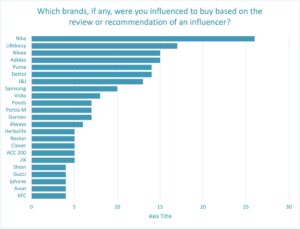
International apparel brand, Nike, has been at the forefront of embracing influencer marketing. In addition to producing campaigns with A-list celebrities and athletes (Ronaldo, Serena Williams, Colin Kaepernick, etc.), Nike also partners with youth influencers and social media sensations, allowing them to evaluate Nike products on their own terms. Other popular apparel brands, such as Adidas and Puma, implement similar strategies.
In a time of crisis, many influencers are using their elevated status for social good. In our study, 73% of respondents in South Africa say the influencers they follow have “promoted social distancing, good hygiene, mask-wearing, etc.” That is reflected in the number of health and hygiene brands respondents say they have been influenced to buy, including Lifebuoy, Dettol, Johnson & Johnson, Vicks, ACC 200, JIK, etc.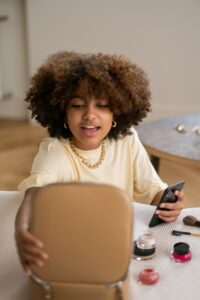
Influencers have proven extremely effective in promoting beauty brands. Consumers want to see real people using and evaluating a beauty product rather than hearing a sales pitch. More than half the respondents in our study consider “pictures of the influencers using the product,” “live videos explaining the product or unboxing,” and “product reviews” from the influencer to be highly influential content. They report being influenced to buy a range of beauty products, including Nivea, Ponds, Portia M, Garnier, Herbalife, Revlon, and more.
Interactive Data Dashboard
To dive deeper into GeoPoll’s data on how brands’ reactions to the world around them influence consumer behaviors and perceptions in South Africa, click here to access the dashboard. The dashboard allows you to view all the data from this study, filterable by country, age group, gender, and question.
About This GeoPoll Survey
GeoPoll is the pioneer in conducting remote research through mobile-based methodologies in Africa, Asia, and Latin America. Our custom research capabilities allow agencies, brands, and international development organizations to conduct one-off or ongoing surveys on any topic, with results delivered in near real-time.
To request more information about this study or get a quote for an upcoming project of your own, please contact us.

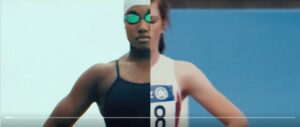 Nike: Nike’s recent “split-screen” ad campaign features a host of professional athletes, including Cristiano Ronaldo, Serena Williams, Colin Kaepernick, and South African athlete Caster Semenya, as well as amateur athletes from a variety of races, ethnicities, religions, genders, and abilities. The message behind the ad is about the power of sports and its ability to unify people.
Nike: Nike’s recent “split-screen” ad campaign features a host of professional athletes, including Cristiano Ronaldo, Serena Williams, Colin Kaepernick, and South African athlete Caster Semenya, as well as amateur athletes from a variety of races, ethnicities, religions, genders, and abilities. The message behind the ad is about the power of sports and its ability to unify people.